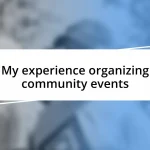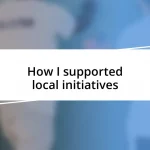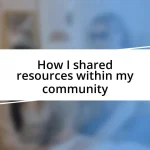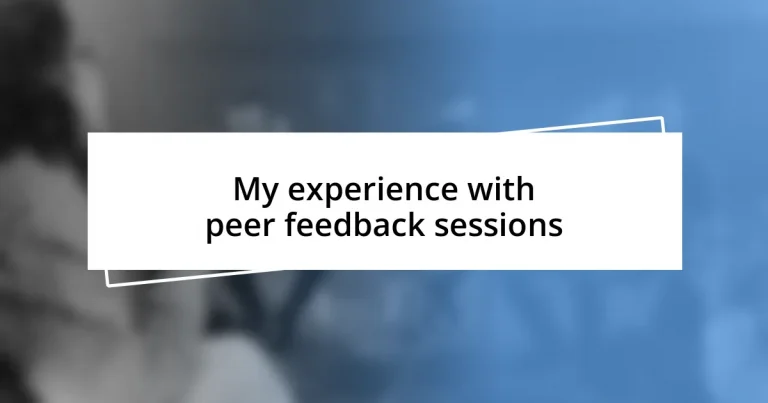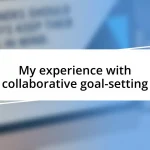Key takeaways:
- Peer feedback sessions foster collaboration and community, leading to personal and professional growth.
- Effective preparation, such as identifying key points and creating a comfortable environment, enhances the quality of feedback discussions.
- Active listening and follow-ups are crucial for processing feedback and nurturing relationships.
- Implementing feedback through actionable plans and sharing progress can significantly boost confidence and productivity.
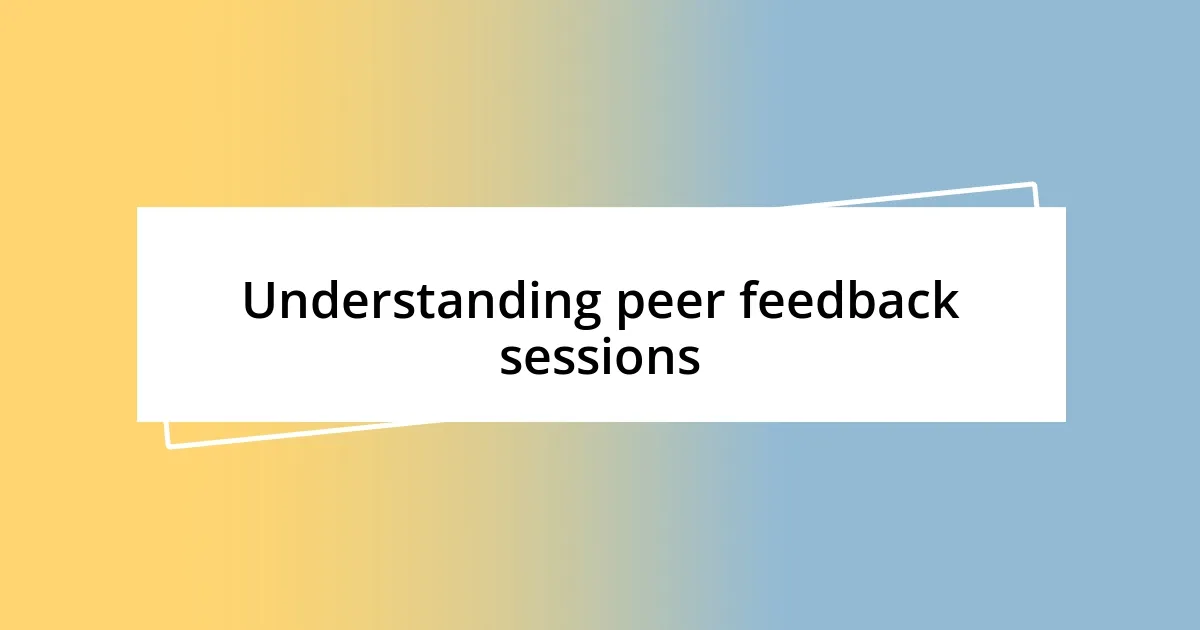
Understanding peer feedback sessions
Peer feedback sessions are a unique opportunity to gain honest insights from colleagues who understand the context of your work. I remember attending a session where my concept was met with both praise and constructive criticism. The mix of emotions I felt was palpable; it’s a blend of vulnerability and excitement that ultimately drives improvement.
In my experience, the value of peer feedback lies in its collaborative spirit. I often find myself reflecting on how we can be our toughest critics, but hearing fresh perspectives allows for moments of revelation. Isn’t it fascinating how a simple suggestion can reshape our thinking? That’s the power of engaging with peers.
These sessions can also create a sense of community among team members. I once facilitated a feedback round where open discussions led to a breakthrough in a project I was working on. Watching others embrace constructive suggestions felt rewarding, reinforcing the idea that we’re all in this together, striving for excellence. Wouldn’t you agree that feedback can sometimes be the catalyst for unexpected innovation?
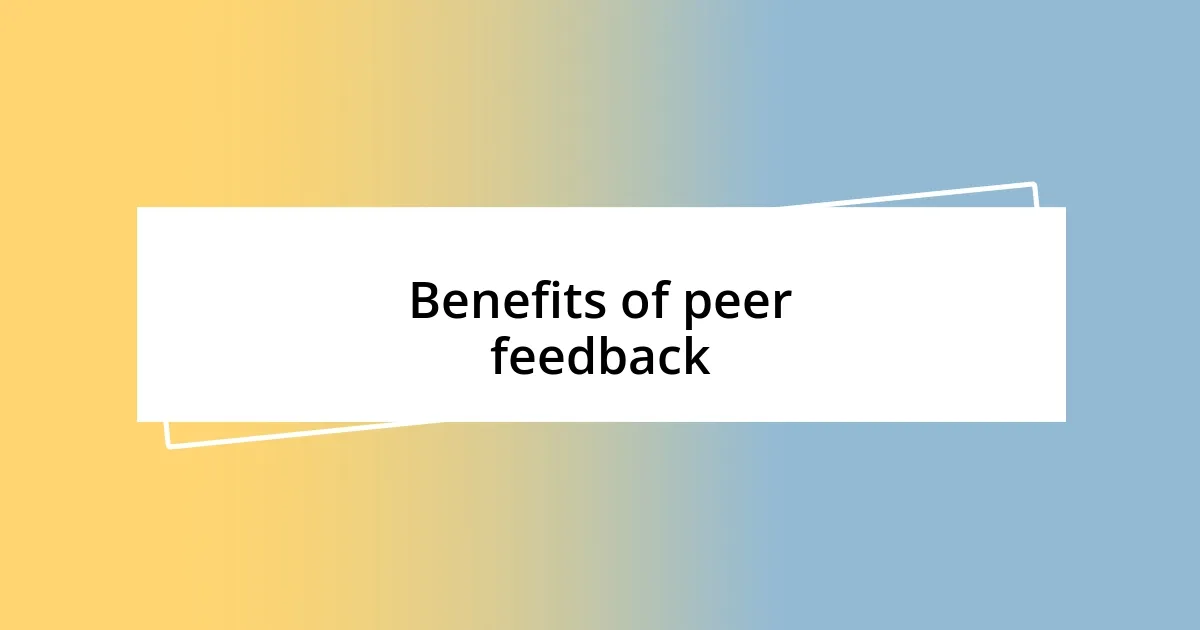
Benefits of peer feedback
Peer feedback is a powerful tool that unveils a wealth of perspectives. I vividly recall a session where I presented my latest project. The input I received was eye-opening; not only did my peers highlight areas for improvement, but they also pinpointed elements I hadn’t even realized were effective. This experience underscored the importance of diversifying our feedback sources to enhance our work.
The benefits of peer feedback extend beyond merely improving individual projects. Here are some of the key advantages I’ve experienced:
- Enhanced Learning: Engaging with peers allows for the exchange of knowledge and skills. I’ve learned techniques from colleagues that I now implement.
- Increased Confidence: Receiving encouragement alongside constructive criticism boosts my self-esteem tremendously.
- Expanded Perspectives: Exposure to diverse viewpoints challenges my own thinking, which often leads to more innovative solutions.
- Strengthened Relationships: Participating in these sessions fosters trust and camaraderie among colleagues, creating an environment where collaboration thrives.
- Ownership of Learning: It empowers us to take charge of our professional growth, as the feedback often feels more relatable and actionable coming from our peers.
Reflecting on my experiences, I realize how invaluable these sessions have been not just for my work, but for building a supportive community that celebrates growth together.
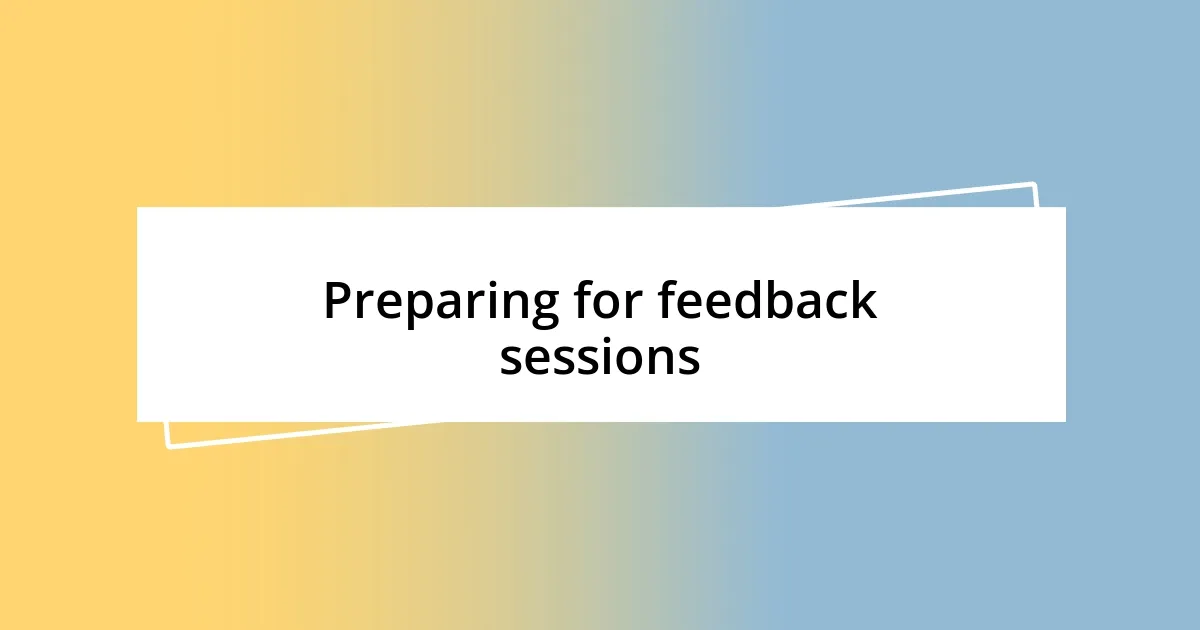
Preparing for feedback sessions
Preparing for feedback sessions can significantly impact their effectiveness. I usually take some time to consider the points I want to address prior to the meeting. This preparation allows me to articulate my thoughts clearly and approach the session with an open mind. It’s fascinating how writing down my expectations can help channel my emotions, making the whole experience smoother and more productive.
Another strategy I’ve found effective is gathering feedback in advance. For instance, I once shared my work with a couple of trustworthy colleagues before the session. Their initial thoughts not only gave me confidence but also provided a foundation for more in-depth discussions later. It’s incredible how an early taste of feedback can transform nervousness into excitement, setting a positive tone for the entire session.
Lastly, I believe it’s crucial to create the right environment for feedback sessions. During one of these meetings, I suggested a casual setting, complete with comfortable seating and refreshments. The relaxed atmosphere encouraged open dialogue and spontaneous sharing, which made a significant difference. Preparing not only involves our work but also how we engage with each other. What techniques have you tried to create a welcoming space for feedback?
| Preparation Strategy | Potential Benefits |
|---|---|
| Identifying Key Points | Gives clearer focus during discussions |
| Gathering Pre-Session Feedback | Builds confidence and outlines key areas for improvement |
| Creating a Comfortable Environment | Encourages open dialogue and reduces anxiety |
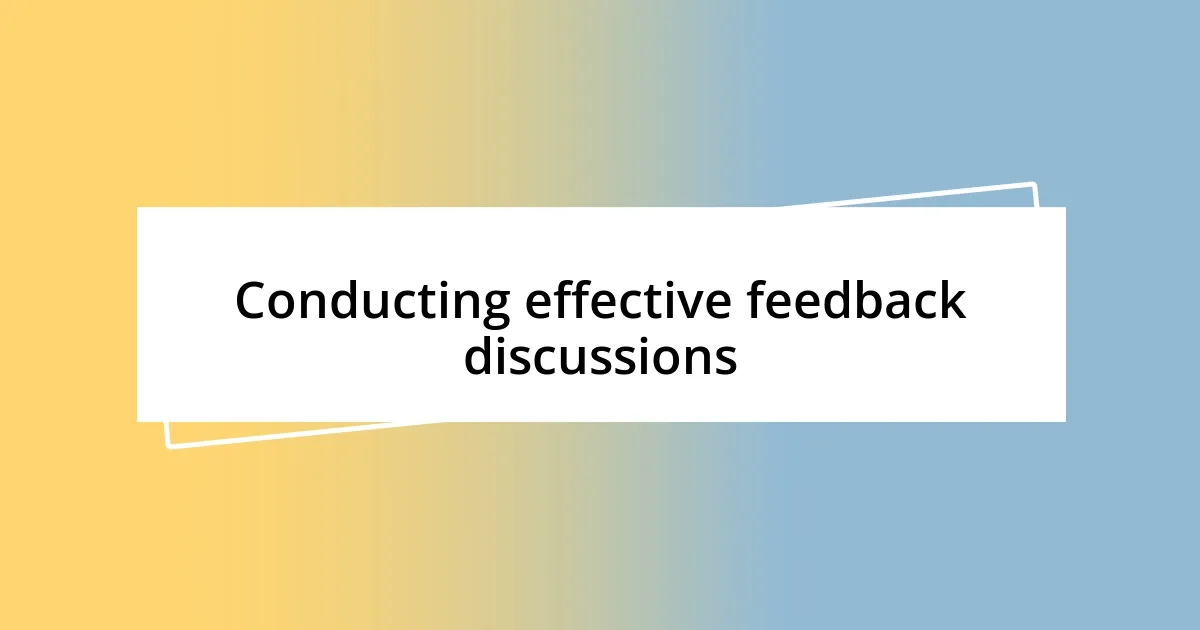
Conducting effective feedback discussions
It’s all about the conversation during feedback sessions. I remember a time when I approached a colleague to discuss my latest project draft. Instead of diving straight into the feedback, we spent a few moments chatting about our experiences. This personal connection not only eased my nerves but also fostered an environment where honest, constructive feedback flowed effortlessly. Have you ever noticed how a bit of casual conversation can set the stage for deeper insights?
Listening actively is another crucial element of effective feedback discussions. I’ve found that when I genuinely focus on my peers, I pick up nuances that can transform the suggestions they offer. There was a session where a colleague highlighted a minor detail about my visuals that I had overlooked. It was amazing how much I learned just by being fully present in that moment, asking clarifying questions, and reflecting on their feedback right away. What impact do you think active listening has had on your feedback experiences?
Finally, following up on the feedback is essential. After a particularly insightful session about my presentation skills, I made it a point to connect with my peers a week later. I asked them how they felt things were going and what they noticed about my improvements. This not only demonstrated my commitment to growth but also reinforced our relationships. It’s rewarding to see how checking in creates a continuous loop of support and growth. How do you keep the dialogue going after feedback sessions?
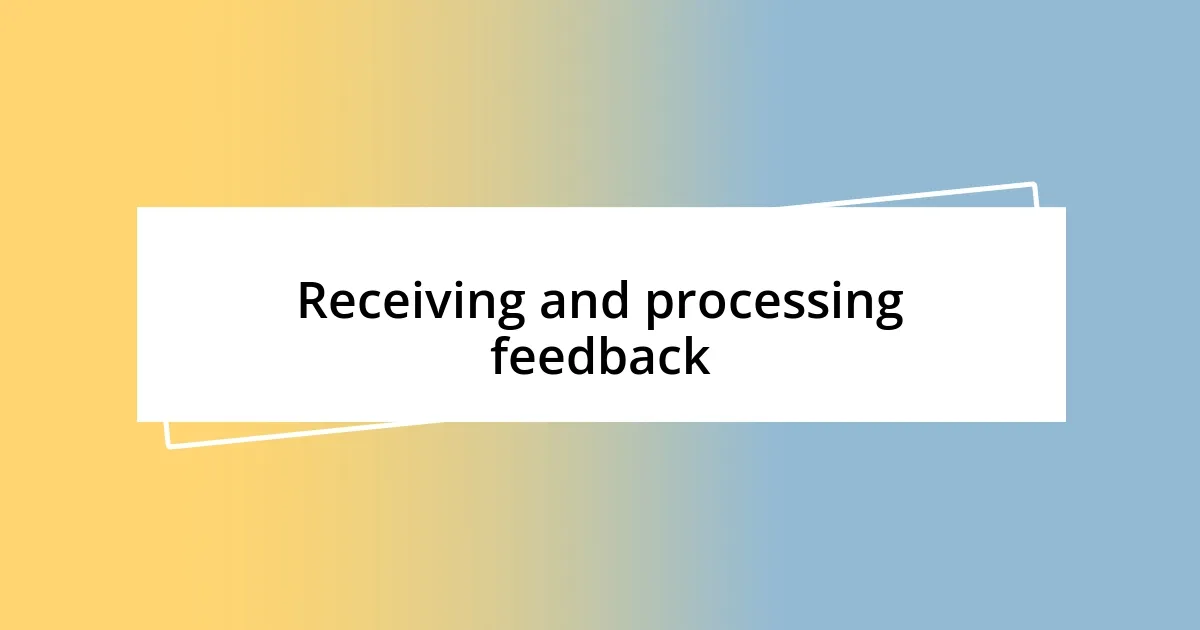
Receiving and processing feedback
Receiving feedback can sometimes feel like walking a tightrope, balancing vulnerability with the desire for improvement. I remember my first peer feedback session; I felt a knot in my stomach as I anticipated the critiques. But as I listened, it struck me how every piece of feedback was a mirror reflecting areas I had overlooked. This realization transformed my perspective—feedback wasn’t just criticism; it was a roadmap for my growth. Have you felt that shift in your own experiences?
Processing feedback requires not just hearing it, but truly absorbing it. After one session, a colleague pointed out that my arguments lacked clarity. Initially, I felt defensive, but then I took a step back and reflected on their words. I realized they were right. Giving myself the space to digest the information allowed me to address those gaps in my work. How do you usually process feedback when it feels overwhelming?
One effective technique I’ve adopted is to jot down feedback during the session. I recall a time when I received contradictory suggestions. By writing everything down, I was able to categorize and prioritize the most relevant points later. This strategy helps me sift through the noise and focus on actionable steps, converting feedback into tangible changes. Do you find note-taking useful for turning feedback into a plan of action?
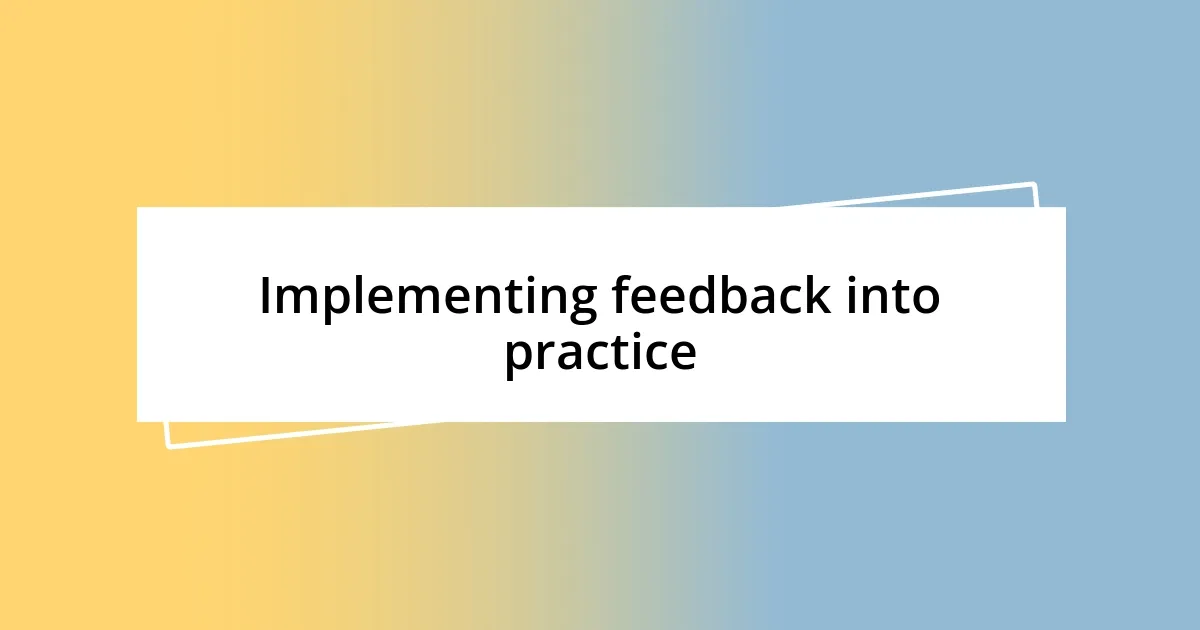
Implementing feedback into practice
Integrating feedback into practice is where the magic really happens. I recall a strong piece of feedback about time management from a peer during a project that both excited and intimidated me. It was daunting to envision adjusting my whole workflow, but I took the leap. By setting clear priorities and breaking tasks into smaller steps, I found my productivity skyrocketed. Have you ever experienced that rush of seeing immediate results from implementing feedback?
Another essential aspect is creating a feedback action plan. After a particularly intense session about my writing style, I crafted a simple checklist based on the suggestions I received. This checklist became my go-to guide, allowing me to systematically address areas for improvement. I felt accomplished crossing off each item, which built my confidence over time. Do you have any favorite methods for translating feedback into actionable tasks?
Finally, I’ve learned that sharing my progress can energize my development journey. After implementing changes based on feedback in my presentation skills, I invited a few colleagues to a follow-up presentation. Their enthusiastic response was so affirming! It reinforced my commitment to growth and opened the door for even more valuable feedback. How do you celebrate your milestones after making changes based on feedback?
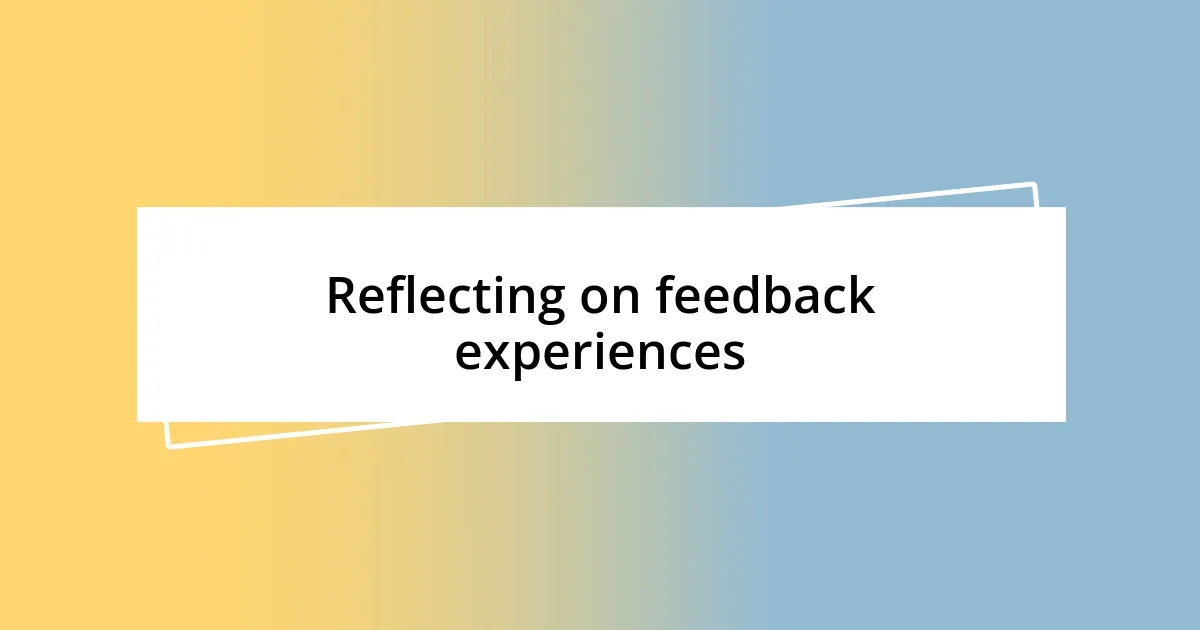
Reflecting on feedback experiences
Reflecting on feedback experiences often brings up a mix of emotions for me. After one particularly tough session, where a mentor pointed out that my project lacked depth, I remember feeling disheartened at first. But then I realized that this feedback, while difficult to digest, illuminated a path I hadn’t considered. It made me wonder—have you ever felt that sting that ultimately led to growth?
In another instance, feedback from a peer made me realize I was overcomplicating my ideas. I was frustrated because I thought I was doing well. Yet, upon reflection, it prompted me to reevaluate my approach and simplify my message. That moment taught me the importance of clarity, not just for myself, but for those I aim to communicate with. How often do we get so wrapped up in our own perspectives that we lose sight of what others truly need from us?
What truly shapes our growth is how we choose to reflect on the feedback we receive. I’ve started setting aside dedicated time to revisit the insights from my sessions, writing down any lingering thoughts or feelings. This practice not only helps me process what I learned, but it also uncovers new layers of understanding. When was the last time you took a moment to reflect on feedback in a way that added depth to your experience?


